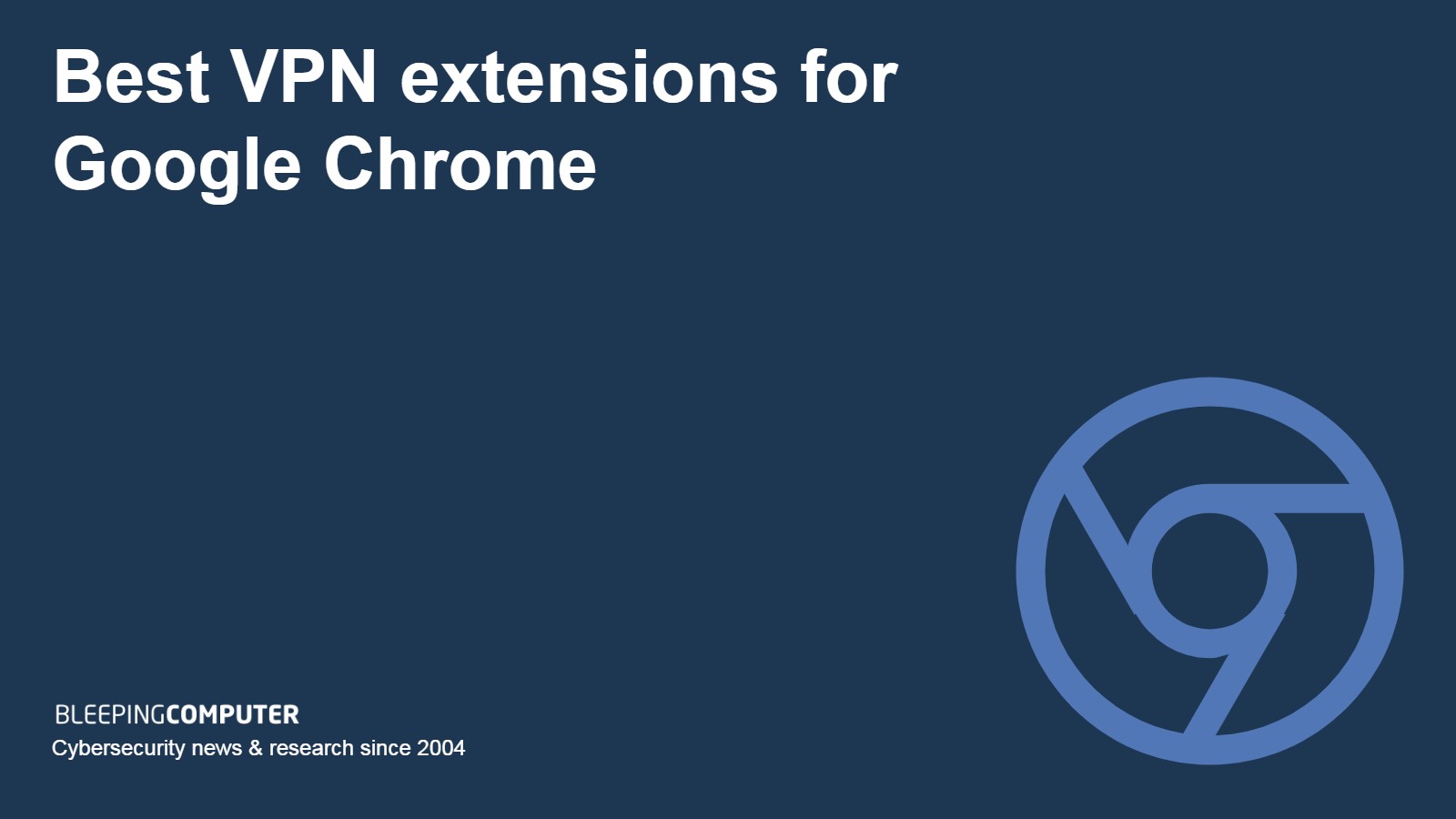If you're searching for the best VPN extensions for Google Chrome, you've come to the right place. Keep your information private and prevent trackers from intercepting your data.
Google Chrome may be the world’s most popular browser, but it leaves a lot to be desired privacy-wise. If you don’t like the idea of being tracked online and sharing your location information, the best VPN extensions for Google Chrome can help. These come with tracker blockers, as well as strong encryption, leak protection, and the ability to spoof your location.
A virtual private network (VPN) allows users to quickly connect to any VPN server in the provider’s network. Once connected, the user’s IP address mirrors that of the VPN server. Furthermore, all traffic flowing between the user’s device and the VPN server is encrypted. This prevents it from revealing users’ online activities to internet service providers (ISPs) and any third-party interlopers.
We’ll examine individual VPN providers in more detail later. For now, here’s a summary of our recommended VPNs for Google Chrome.
Best VPN browser extensions for Google Chrome:
- NordVPN: Our recommended VPN extension for Google Chrome. Comes with threat protection, split tunneling, and quick-connect. Provides fast speeds and access to RAM-only servers in 60+ countries. Plans come with a risk-free 30-day money-back guarantee.
- Surfshark: Best budget VPN extension for Google Chrome. Provides access to RAM-only servers in 100+ countries, as well static IP addresses and split tunneling. Protects users against ad, trackers, and malware.
- ExpressVPN: Has a VPN extension for Google Chrome with HTML5 geolocation spoofing and access to RAM-only servers in 105+ countries. Includes WebRTC blocking and allows users to only permit connections to HTTPS sites.
- Proton VPN: Provides a Google Chrome VPN extension with access to servers in 69+ countries. Comes with split tunneling, auto-connect, and options for MultiHop connections. Has an audited no-logs policy.
- CyberGhost: Has a free browser extension for Google Chrome, which acts as a taster for the full VPN service. It provides leak protection and a malware and tracker blocker. Access is permitted to eight servers in four countries.
- Private Internet Access: Subscriptions include a VPN browser extension for Google Chrome. This can force websites to use HTTPS and will stop trackers and ads. It provides WebRTC protection and access to servers in 91+ countries.
Summary Table
| No value | TEST WINNER | No value | No value | No value | No value | No value |
| No value |
NordVPN
 www.nordvpn.com www.nordvpn.com
|
Surfshark
 www.surfshark.com www.surfshark.com
|
ExpressVPN
 www.expressvpn.com www.expressvpn.com
|
Proton VPN
 www.protonvpn.com www.protonvpn.com
|
CyberGhost
 www.cyberghost.com www.cyberghost.com
|
Private Internet Access
 privateinternetaccess.com privateinternetaccess.com
|
| Ranking | 1 | 2 | 3 | 4 | 5 | 6 |
| Avg Speed (Mbps) | 100+ Mbps | 100+ Mbps | 100+ Mbps | 100+ Mbps | 100+ Mbps | 100+ Mbps |
| Number of Countries | 60 | 100 | 94 | 85+ | 88 | 84 |
| Number of Countries | 60 | 100 | 94 | 85+ | 88 | 84 |
| Devices Supported | Windows, MacOS, iOS, Android, Linux, Smart TVs, Routers | Windows, MacOS, iOS, Android, Linux, Smart TVs, Routers | Windows, MacOS, iOS, Android, Linux, Smart TVs, Routers | Windows, MacOS, iOS, Android, Linux Android TV | Windows, MacOS, Linux (command line), iOS, Android, Amazon Fire TV | Windows, MacOS, iOS, Android, Linux, Amazon Fire TV |
| Streaming Services | Netflix, Amazon Prime, BBC iPlayer, Sky Go, ITV Hub | Netflix, Amazon Prime, BBC iPlayer, Sky Go, ITV Hub | Netflix, Amazon Prime, BBC iPlayer, Sky Go, ITV Hub | Netflix, Amazon Prime, BBC iPlayer, ITV Hub | Netflix, Amazon Prime, BBC iPlayer, Sky Go, ITV Hub | Netflix, BBC iPlayer |
| Browser Extensions | Chrome, Firefox, Firefox for Android | Chrome, Firefox, Edge | Chrome, Firefox, Safari | Chrome, Firefox | Chrome, Firefox | Chrome |
| Best deal (per month) | $3.09 SAVE 63% + FREE months |
$2.29 85% off 2yr starter plan |
$6.67 Save 49% |
$4.99 SAVE 50% |
$2.03 SAVE 84% |
$2.03 SAVE 84% |
Before making our recommendations, we test providers against a list of criteria. These are outlined below and expanded upon later in the article, where we discuss our testing methodology in greater detail. The best VPN extensions for Google Chrome must tick the following boxes:
- Google Chrome browser extension available
- Large server network
- Fast connection speeds
- Robust security and privacy
- Able to access streaming services
- Good value for money
To be included as one of our top three providers, we additionally require VPNs to have a RAM-only server network, independently audited software and infrastructure, effective obfuscation, and a location beyond the reach of cross-border spying alliances.
Get a risk free trial
NordVPN offers a risk-free 30-day trial so you can sign up here with zero risk. You can use the VPN rated #1 on this list with no restrictions for a full month.
There are no hidden terms - just contact support within 30 days if you decide NordVPN isn't right for you and you'll get a full refund. Start your NordVPN trial here .
Best VPN extensions for Google Chrome
Now let’s explore each of our recommended providers in a little more detail:
1. NordVPN

Subscriptions to NordVPN includes a browser extension for Google Chrome. This has a quick connect feature that makes it easy to access the fastest NordVPN server in 60+ countries. Users are permitted unlimited bandwidth and data.
Connections are protected using TLS. Users benefit from an ad and malware blocker, and split tunneling. The extension disables the WebRTC protocol, which can otherwise leak users’ IP addresses.
For system-wide protection, users can download one of the NordVPN apps. These are available for Windows, macOS, iOS, Android, Amazon Fire TV, and Linux. They come with additional features such as strong encryption, built-in leak protection, and a kill switch.
NordVPN apps allow one-click connection to the Tor network, and access to obfuscated servers that can bypass Chinese VPN blocks. Users can choose to route traffic through two VPN servers for an extra layer of encryption.
NordVPN is a great choice for streaming and is able to access content from numerous platforms, including Netflix, Amazon Prime Video, Hulu, and BBC iPlayer. It can help VPN-incompatible devices like smart TVs and games consoles spoof their location using the SmartPlay feature.
Following a minor attack on a server in a third-party data center in Finland, NordVPN made its entire server network RAM-only. It introduced a number of additional security measures, such as colocated servers and a bug bounty program. The company adheres to a strict no-logs policy and undergoes regular independent third-party audits of its software and infrastructure.
Pros:
- Browser extension for Google Chrome
- Very fast connection speeds
- RAM-only servers in 60+ countries
- WebRTC protection
- Audited no logs policy
- Built-in malware and ad-blocker
Cons:
- Data breach in 2018
- Low device connection limit
BEST VPN FOR GOOGLE CHROME: NordVPN is our top choice. Its Chrome browser extension provides access to speedy RAM-only servers in 60+ countries, and comes with threat protection and split tunneling. NordVPN plans include a risk-free 30-day money-back guarantee.
Read our full review of NordVPN.
2. Surfshark

Surfshark’s Google Chrome browser extension is included with all subscriptions. It provides access to RAM-only servers in 100+ countries and allows users to choose which websites they want to exclude from the VPN tunnel.
Servers with static IP addresses are available in six countries. These allow users to connect with the same IP address every time. Other features include an ad blocker, a cookie pop-up blocker, and a data breach and malware alert service.
Users who want to include more than just their browser in the VPN tunnel can download one of Surfshark’s easy-to-use apps. These are available for Windows, macOS, iOS, Android, Amazon Fire TV, and Linux. You'll be able to connect with unlimited simultaneous devices, allowing the user to share an account with friends and family.
Features include strong encryption, built-in leak protection, and a kill switch. The company’s Nexus Technology provides additional security by rotating users’ IP addresses in-session, and letting them specify entry and exit servers for MultiHop connections.
The service is great for streaming and can access content from Netflix, Amazon Prime Video, BBC iPlayer, Disney+, and HBO Max. It includes a smart DNS service to help VPN-incompatible devices access geo-restricted content. Connection speeds are fast enough for watching video in 4K.
Surfshark is no longer independent, having merged with Nord Security – NordVPN’s parent company – in 2022. In a press release issued at the time of the merger, Surfshark said that it would continue to operate autonomously. It has since had its no-logs policy verified by Deloitte.
Pros:
- Chrome browser extension available
- RAM-only servers in 100+ countries
- Great for streaming
- Additional CleanWeb control
- Audited zero logs policy
Cons:
- No longer independent
- No port forwarding
GREAT VALUE: Surfshark’s Chrome browser extension provides access to RAM-only servers in 100+ countries as well as URL-based split tunneling and static IP addresses. Plans include unlimited device connections and a 30-day money-back guarantee.
Read our full review of Surfshark.
3. ExpressVPN

ExpressVPN’s Google Chrome browser extension is designed to be used in conjunction with a VPN app. The extension allows users to control the device’s VPN, and provides easy access to the fastest RAM-only servers in 105+ countries.
It can spoof users’ HTML5 geolocation to match that of the VPN server they’re connected to. This helps avoid discrepancies when accessing sites using HTML5. For additional security, users can disable WebRTC and default to the HTTPS versions of websites.
ExpressVPN apps are available for Windows, macOS, iOS, Android, Android TV, Nvidia Shield, Amazon Fire TV, and Linux. These come with strong encryption, a kill switch, built-in leak protection, and a tracker and malware blocker. You'll also find custom router firmware, working with a variety of compatible models.
The company has its own lightweight connection protocol that helps ensure speeds fast enough for lag-free gaming and buffer-free streaming. Its Trusted Server technology involves reinstalling the operating systems of every server in its network on a weekly basis.
ExpressVPN has a dedicated Onion site on the Tor network and obfuscation that’s enabled by default. This makes it a good choice for anyone living in a restrictive country like China, Egypt, or Iran.
The service works exceptionally well with popular streaming platforms like Netflix, Amazon Prime Video, Hulu, and Disney+. Its MediaStreamer tool can help devices that don’t natively support VPN software access geo-restricted content.
Since 2021, ExpressVPN has been owned by cybersecurity firm Kape Technologies. Although now well established, Kape – under its former name of Crossrider – was heavily criticized for creating software designed to inject adverts into users’ browsers.
In the year following its acquisition, ExpressVPN had 12 independent audits of its software and infrastructure. These confirmed its ongoing commitment to a no-logs policy.
Pros:
- Browser extension available for Google Chrome
- RAM-only servers in 105+ countries
- Audited no logs policy
- HTML5 geolocation spoofing
- Disables WebRTC
Cons:
- Relatively expensive
- Parent company has a questionable past
GEOLOCATION SPOOFING: ExpressVPN’s Chrome browser extension is very fast and can protect against WebRTC leaks, spoof users’ HTML5 location, and default to HTTPS websites. Subscriptions include a 30-day money-back guarantee.
Read our full review of ExpressVPN.
4. Proton VPN

Proton VPN subscriptions include a browser extension for Google Chrome. This provides users with one-click access to the fastest servers in 69+ countries. A split tunneling feature allows them to choose which websites operate outside the VPN tunnel.
For sensitive traffic, the company’s SecureCore servers route data via Proton VPN’s high-security data centers in Switzerland, Sweden, and Iceland.
Proton VPN is a good option for streaming, with very fast speeds and easy access to platforms like Netflix, Amazon Prime Video, HBO Max, Hulu, and BBC iPlayer. Torrenting is supported, and port forwarding improves speeds when seeding or leeching.
For device-wide protection, users can choose between apps for Windows, macOS, iOS, Android, Linux, and FireTV. These are all open-source and come with a kill switch, built-in leak protection, strong encryption, and an ad-blocker. Subscriptions include up to 10 simultaneous device connections and the service is compatible with routers. You'll also find a trio of free server locations in Japan, the Netherlands, and the US.
Proton VPN’s no-logs policy is transparent and easy to understand. It’s been verified via third-party audits of the company’s software and infrastructure. The company also lists any requests for customer data on its website, in a commitment to online privacy.
Pros:
- Browser extension available for Chrome
- Auto-connect option
- Split-tunneling
- MultiHop connections
Cons:
- Relatively small server network
- Quite expensive
MULTIHOP OPTIONS: Proton VPN’s Chrome browser extension comes with access to servers in 69+ countries, and options for split tunneling and MultiHop connections. Free locations, strong security. Subscriptions come with a 30-day money-back guarantee.
Read our full review of ProtonVPN.
5. CyberGhost

CyberGhost's Chrome browser extension is free – though it’s very much limited in what it can do. Users are permitted access to just eight of the almost ten thousand servers in the company’s network, while speeds are only really good enough for day-to-day browsing.
The extension does provide a good level of privacy and security. It blocks both trackers and malware-harboring websites, and offers protection against WebRTC leaks.
For the full CyberGhost experience, users will need to take out a subscription. This provides access to RAM-only servers in 100+ countries and speeds fast enough to stream 4K video without buffering.
The company has servers optimized for gaming, torrenting, and individual streaming platforms like Netflix, Amazon Prime Video, HBO Max, Hulu, Peacock, Disney+, and Paramount+. Windows users can specify that apps connect automatically to these servers in the Smart Rules area of the desktop app.
As well as Windows, CyberGhost has apps for iOS, Android, macOS, and Linux. These are all well-designed and enjoyable to use. They come with built-in ad and malware blocking, and provide protection against DNS, IPv6, and WebRTC leaks.
CyberGhost has been owned by Kape Technologies since 2017. It operates independently to other Kape VPN brands and has had its no-logs policy independently audited by Deloitte for peace of mind.
Pros:
- Free Chrome browser extension
- WebRTC protection
- Tracker and malware-blocker
- Streaming-optimized servers in multiple locations
Cons:
- Only eight servers available
- Relatively slow speeds
FREE BROWSER EXTENSION: CyberGhost’s browser extension is free, though lacking access to the company’s full server network. It protects users against malware, adverts, and WebRTC leaks. Subscriptions come with a 45-day money-back guarantee.
Read our full review of CyberGhost VPN.

Private Internet Access’s browser extension for Google Chrome disables the WebRTC protocol as well as blocking adverts and tracking cookies. It can force websites to use HTTPS when available and provides users with access to servers in 91+ countries.
For device-wide protection, Private Internet Access has apps available for Windows, Android, macOS, iOS, and Linux. These are all open-source and come with a kill switch, split tunneling, and access to SOCKS5 proxy servers.
Port forwarding is allowed, which makes the service ideal for torrenters. Access to streaming platforms varies. For example, we were able to connect to both Netflix and BBC iPlayer during testing, but not Amazon Prime Video. A smart DNS tool is available to access geo-restricted content with VPN-incompatible devices. Connection speeds are above average – though not in the same league as the fastest providers.
Private Internet Access is one of the older VPN companies, having been in the business for more than a decade. In 2019, it was acquired by Kape Technologies. It has since had its server network and management systems independently audited by Deloitte.
The company has a verified no-logs policy that’s been tested in court, and an ongoing bug bounty program.
Pros:
- Chrome browser extension available
- WebRTC protection
- Tracker and ad-blocker
Cons:
- US-based
- Doesn’t work in China
STRONG ON SECURITY: The Private Internet Access Chrome browser extension blocks WebRTC, trackers, and adverts. It can force websites to use HTTPS and provides access to servers in 91+ countries. Plans come with a 30-day money-back guarantee.
Methodology for choosing the best Chrome VPN extensions
Although there are many VPN providers that offer browser extensions, far fewer also provide the range of features we consider necessary. The criteria we test providers against using our testing methodology are discussed below.
- Google Chrome browser extension available: In addition to the apps used to provide device-wide protection, we looked for providers that offered browser-only protection for Google Chrome. The provider must also have usable apps for a range of additional operating systems.
- Large server network: VPN providers with lots of servers make it easier for users to establish speedy connections in nearby regions, while also allowing for access to far-flung destinations. Large server networks help ease congestion and make individual server downtime less of an issue.
- Fast connection speeds: With ever faster home broadband speeds now available, it’s important to choose a VPN that won’t significantly slow your connection. We perform regular speed tests to find the fastest providers. We only include those that are at least fast enough to stream HD video without buffering.
- Robust security and privacy: VPN companies must be able to provide adequate levels of security and privacy. To do this, they need to have a strict no-logs policy, strong encryption, a kill switch, and leak protection. Ideally, they should also offer obfuscation, MultiHop servers, split tunneling, and port forwarding.
- Able to access streaming services: Very few VPN providers are able to access the most popular international streaming platforms – despite the claims made on their websites. This is because streaming platforms invest significant time and energy into blocking VPNs. To keep on top of the situation, we regularly test which providers work with big-name services like Netflix, Amazon Prime Video, BBC iPlayer, Hulu, and Disney+.
- Good value for money: Access to the best browser extensions normally requires a VPN subscription. How much you pay for this subscription depends on the specific features you require. As this is different for everyone, we try to include quality VPN providers at a range of price points.
Bonus points
To make it to one of our top three positions, VPN companies must additionally offer the following features:
- Access to China: The Chinese government is committed to restricting its citizens’ access to the open internet. It has developed sophisticated – and effective – systems to block VPN usage. The result is that only a few VPN providers remain operational within the country. These are crucial for those hoping to circumvent censorship in China and other repressive nations.
- Diskless servers: The best VPNs improve data security by exclusively using RAM-only servers in their networks. These operate on volatile memory, which is erased upon server shutdown or reboot. In contrast, conventional servers use magnetic disk or solid-state drives to retain data over the long term, thereby presenting a more enticing target for hackers and law enforcement entities.
- Incorporation outside the scope of intelligence alliances: The Five Eyes, SIGINT Seniors Europe, and Maximator are all examples of known cross-border intelligence sharing alliances. These alliances allow member states to conduct surveillance on each other's citizens – thereby bypassing domestic laws that prohibit direct spying on their own populace. To avoid becoming unintentionally involved in their activities, the better VPN providers incorporate their companies beyond the reach of known spying alliances – in countries such as Panama and the British Virgin Islands.
- Audited software and infrastructure: Placing trust in VPN companies can be difficult when certain providers, who initially claim not to keep any data logs, later admit to doing so. To reassure concerned consumers, many reputable providers now engage credible third-party auditors to thoroughly review their software and infrastructure. These audits validate any no-logs assertions and help identify any potential software vulnerabilities.
How to use a VPN extension with Google Chrome
Using a VPN browser extension with Google Chrome is straightforward. Just follow these simple steps:
- Choose a VPN with Google Chrome browser extensions available. We recommend NordVPN.
- Sign up for a subscription. Longer deals almost always offer better value for money.
- Click on the three vertical dots in the top right corner of the Chrome browser and select “Extensions” and then “Visit Chrome Web Store” from the drop-down menu.
- Enter the name of your chosen provider in the “Search the store” field.
- Select the relevant add-on.
- Click the “Add to Chrome” button.
- Open the extension and use the “quick connect”, or equivalent, button to connect to a VPN server.
Can I use a free VPN extension with Google Chrome?
You can, but it’s unlikely to provide a satisfactory experience. Free Chrome browser extensions tend to be slow. This is because the VPN companies behind them almost always have too few servers for the number of users they attract. Furthermore, these small server networks are relatively easy for streaming platforms, and other online geo-restricted services, to identify as belonging to a VPN company and block.
Most free browser extensions are ad-based and have some form of logging policy that enables them to use trackers to gather user data. Some services have other security issues, such as a tendency to leak users’ IP addresses, or failing to apply any encryption to users’ internet traffic. The worst ask for unnecessary permissions that can result in them acting as vectors for malware.
Not all free VPN browser extensions for Google Chrome are necessarily actively bad. There are some that don’t rely on ads and are typically offered as tasters for subscription-based services. As such, they offer many of the same security and privacy features – the CyberGhost browser extension is one such example. However, even these have the same speed and streaming issues.
Google Chrome extension VPN or proxy?
Proxy extensions route your browser's web traffic through a remote server, allowing you to access region-restricted content and hide your IP address from websites you visit. However, they don't encrypt all internet traffic from your device like a true VPN does. This means that the Chome proxy extension does not provide the same level of data protection and privacy as the main VPN client.
Full VPN services, on the other hand, create an encrypted tunnel for all your internet traffic, providing comprehensive privacy and security. This means that traffic from all your applications are protected with the VPN's encryption.
As a result of this distinction, browser-based VPNs have use limitations. They can be convenient for quick tasks like accessing geo-blocked content or unblocking websites. Chrome VPN extensions are also perfect for people who need to bypass blocks at work - but aren't able to install a full VPN client due to a lack of installation privileges.
However, remember that despite being lightweight and easy to install, they do not protect your entire device, or provide encrypted connections, meaning that they will not stop ISPs and local network admins from being able to detect what you are doing online. For this, you should use a full VPN client.
One exception to this rule is ExpressVPN. Its Chrome extension only works when you also install the main VPN client. That extension remote controls the main client, which means that when you connect to a VPN server in your browser, the main VPN app launches the connection and encrypts all the data coming and going from your devices. This means you get the same level of protection when using the Chrome extension as you get with the main VPN client.
Best VPN extension for Google Chrome – FAQs
Is there a built-in VPN on Chrome?
No, Chrome does not have a built-in VPN. There are browsers that do, however. These include Epic, Avast, Opera, Aloha, and UR. If you can’t drag yourself away from Chrome, but want improved privacy, the best option is to use one of our recommended VPN browser extensions. It only takes a few minutes to install a VPN for Chrome, and most providers have native app support for all major operating systems.
Can I use a browser extension at school or work?
A browser extension can be a way of changing your IP address and bypassing website blocks on devices that won’t let you install full VPN apps. However, they’re not infallible. As browser extensions are not true VPNs, local network administrators may still be able to see what you’re doing online. Extensions only focus on browser traffic, while VPNs encrypt all data sent to and from your device.
Does Chrome’s incognito mode protect my privacy?
To a certain extent. It prevents other people who may use your device from seeing your browsing history or information entered in forms. Although cookies and site data are remembered while you're browsing, Google says that they’re deleted when you close the Incognito window.
Information such as your IP address and location will still be visible to websites, ISPs, and search engines. VPN software is the best option for keeping this information safe from prying eyes.
Do VPNs leak Chrome’s prefetching DNS queries?
Prefetching refers to Chrome’s practice of submitting DNS requests before a user clicks a link. Simply hovering over a link is enough to make a DNS request for a domain. Queries are also made for domains in the address bar's drop-down autofill.
All the providers in our recommended list use their own servers for prefetched queries. Others don’t, resulting in DNS leaks observable to third parties. To prevent leaks, the easiest option is to switch to a leak-proof provider, such as NordVPN. Another is to turn off prefetching in the “Privacy & Security” area of Chrome’s “Settings”. Toggling the following settings to off will stop prefetching – though it will result in marginally slower site-loading times:
- Use a prediction service to help complete searches and URLs typed in the address bar.
- Use a prediction service to load pages more quickly.

Post a Comment Community Rules
You need to login in order to post a comment
Not a member yet? Register Now